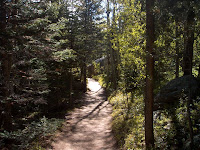I've always understood prayer to be pretty effective - not just in my personal relationship with God, but also for affecting what happens in the world. I agree there's definitely the sense in the Gospels of Jesus taking time out in prayer to learn his Father's will (as Duane and others have mentioned above) but surely the overwhelming teaching of Jesus is that God responds to prayer and our prayers therefore have real consequences in the world, e.g. Luke 21.36, Matt 7.11 'how much more will your Father in heaven give good gifts to those who ask him', Luke 10.2 'ask for workers', Luke 22.32 (in verse 31 it sounds like Satan is also able to pray!)... and I haven't even mentioned some of the most famous verses about prayer!
What I understand from what Boyd and others teach is that because God is relational he has chosen to mediate his authority through free agents such as ourselves and angels etc.* Although the plan was for us to rule 'under authority' (c.f. Luke 7.8), we have real delegated responsibility. To this end God has chosen to limit his influence and authority in the world according to our direction and desire. The really challenging thing about this view is that it makes prayer absolutely critical. God's involvement - to a certain extent - depends on us asking for it! When we pray 'your will be done' we're apparently - in a really odd way - actually giving God 'permission' to act to bring about his will. Sounds crazy, doesn't it?
I actually think this view has a lot to recommend it, as it makes sense of Jesus' instructions about prayer and the importance Paul obviously gives to prayer (e.g. 1 Thess 3.10). God is genuinely responsive to our prayers, relational even in the exercise of his sovereign authority. That sounds like a truly dynamic relationship! It's also interesting to note the way Paul talks about being coworkers with God.
[*At the beginning humankind is given dominion over the earth (Gen 1.26-28) but unfortunately it seems we surrendered our authority to Satan, who is now the 'prince of this world' (John 12.41). But Daniel 7 indicates that part of our final destiny is to finally reclaim this authority in the kingdom of Jesus.]
Comments?



